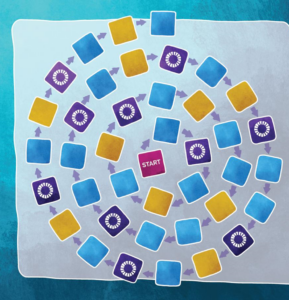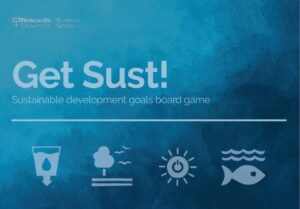Tracy Scurry (Professor of Work and Employment) and Sarah Carnegie (Senior Lecturer in HRM)
Newcastle University Business School
Faculty of Humanities and Social Sciences
What did you do?
We worked in partnership with students to develop a game-based learning approach to engage Business School students with sustainable development and the UN Sustainable Development Goals. The aim of a game-based approach was to facilitate a social and developmental learning experience which would not only introduce the students to sustainable development but would also help with community building with a particular emphasis on the value of different perspectives and experiences.
Who is involved?
Sarah Carnegie, Senior Lecturer, Newcastle University Business School
Tracy Scurry, Professor of Work and Employment, Newcastle University Business School
Emily Yarrow, Senior Lecturer, Newcastle University Business School
Final year N200 Students (Graduated 2020): Jonty Carr, Benjamin Deepak Inian, Harit Jiaravongtrakul, Jessica Loyal, Alice Pertwee, Andrew Petyt, Matt White
How did you do it?
The game was developed by final year Business and Management students in 2019/20 as part of their 40-credit capstone Management Consultancy Module [BUS3053]. On this module teams of students complete a business project for a ‘real-life’ client, undertaking research and identifying solutions to address the agreed client brief. One of these clients was the Newcastle University HaSS Faculty Associate Dean (Undergraduate), Dr Tracy Scurry, who provided the project brief to make use of ‘gamification’ as a means of learning and thus design a ‘game’ that could support the personal development of students by enhancing their teamworking skills and global and cultural awareness.
The student team consisted of Jonty Carr, Benjamin Deepak Inian, Harit Jiaravongtrakul, Jessica Loyal, Alice Pertwee, Andrew Petyt, Matt White. They undertook an extensive review of the literature related to cross-cultural comptence, gamification and board games. As the project developed the sustainable development goals emerged as a central element of the game. The student team then engaged in interviews with experts (academics and professionals), testing of existing board games and focus groups to test their prototypes. The students presented their report and prototype in March 2020.

Testing the prototype board games
Since then we have worked with developing the game for ‘mass production’ and exploring roll out of the game within NUBS. The NUBS marketing team, supported by internal funding from the Business School, developed the board and hard copies of the game have been produced. We are now in the process of implementing and embedding the GetSust! in the student experience.

The final product
The funding has also supported the development of an evaluation framework – developed with Karen Laing from the Inclusive Newcastle Knowledge Centre. The evaluation is ongoing.
Next steps:
- Further pilots with exchange students
- Embed during induction
- Develop and implement evaluation process
- Pilots to inform development of indicators
- Work with others to pilot elsewhere
- Review lessons from evaluation
Why did you do it?
It is widely acknowledged that higher education has a role to play in creating sustainable futures through ensuring graduates are ready for addressing the global challenges that the world faces (including but not limited to environmental, economic and social factors) (QAA, 2020). This is not simply teaching students about sustainability and sustainable development but encouraging them to consider concepts of global citizenship, environmental stewardship, social justice, ethics and wellbeing in the context of their own discipline and in their future professional and personal lives both now and in the future (UNESCO, 2017). These sustainable development competencies are increasingly recognised and valued by employers.

The Get Sust! board game
Does it work?
We are currently in the process of evaluation! Initial pilot of the evaluation process has resulted in valuable feedback.
Preliminary analysis of evaluation:
- Positive experience to generate discussion and connect with fellow students
- Timing of game in programme – would like at start of the programme
- Raised awareness of SDGs existence (6 had heard of them previously)
- Majority felt that they had learned a lot about others experiences and perspectives
Download and Print
The game is available to download and use under (Attribution-NonCommercial–ShareAlike 4.0 International)
Download and print the game now to use in your own classes.
The Graduate Framework
The project demonstrated the following attributes:
- Socially responsible
- Future focused
- Critical thinkers
- Creative, Innovative and Enterprising
- Curious
- Collaborative
More Information
Michelle Black, Learning Design & Curriculum Development Advisor in LTDS has been working with the project, developing the board game materials for sharing under Creative Commons. If you are interested in accessing these, please email sarah.carnegie@newcastle.ac.uk for more details.
